
THE VOICE OF INTERNATIONAL LITHUANIA
|
VilNews has its own Google archive! Type a word in the above search box to find any article.
You can also follow us on Facebook. We have two different pages. Click to open and join.
|
Archive for January, 2013
- Posted by - (0) Comment

Lithuanians
in the World
VilNews will from time to time present Lithuanians who have left the home country and made some kind of career abroad. We are this time not so much looking for celebrity articles, more for some unusual life stories describing Lithuanians who have settled somewhere in the world. Send us your story!From Vilnius University
to modeling in Milan
Giedrė Jotautaitė, Milan, Italy
I'm from Vilnius, born and raised here. I finished school in Vilnius and afterwards I studied Business Information Management at the University of Vilnius. Two years ago, the university required us to have practice from a business, and as I have always wanted to travel more, I decided to practice outside Lithuania. I had a friend in Italy who helped me to find a company where I could do this. So I filled in all the papers and participated in an Erasmus practice competition, and won! Afterwards I came to live in Milan. I chose Italy for many reasons: Milan has always been the centre of fashion, attracting many people from all over the world. I love Italian climate, food, their basic outlook on life and ability to do less than what is needed and not be punished. Italy has everything – mountains, sea, culture and architecture, beautiful history ... They have very good taste for living, which includes everything: from clothes to where to go on vacation.
When I participated in the Erasmus programme I fell in love with an Italian guy, at first I thought it would be just a game, but after that it became a really beautiful, lasting thing.
I came back to Lithuania after Erasmus to pass exams in Vilnius University and after I finished I thought I would go back to Italy just for the summer, but time goes very fast and I'm still here…
- Bookmark :
- Digg
- del.icio.us
- Stumbleupon
- Redit it
- Posted by - (0) Comment

Lithuanians
in the World
VilNews will from time to time present Lithuanians who have left the home country and made some kind of career abroad. We are this time not so much looking for celebrity articles, more for some unusual life stories describing Lithuanians who have settled somewhere in the world. Send us your story!From Vilnius University
to modeling in Milan

Giedrė Jotautaitė, Milan, Italy
I'm from Vilnius, born and raised here. I finished school in Vilnius and afterwards I studied Business Information Management at the University of Vilnius. Two years ago, the university required us to have practice from a business, and as I have always wanted to travel more, I decided to practice outside Lithuania. I had a friend in Italy who helped me to find a company where I could do this. So I filled in all the papers and participated in an Erasmus practice competition, and won! Afterwards I came to live in Milan. I chose Italy for many reasons: Milan has always been the centre of fashion, attracting many people from all over the world. I love Italian climate, food, their basic outlook on life and ability to do less than what is needed and not be punished. Italy has everything – mountains, sea, culture and architecture, beautiful history ... They have very good taste for living, which includes everything: from clothes to where to go on vacation.
When I participated in the Erasmus programme I fell in love with an Italian guy, at first I thought it would be just a game, but after that it became a really beautiful, lasting thing.
|
I came back to Lithuania after Erasmus to pass exams in Vilnius University and after I finished I thought I would go back to Italy just for the summer, but time goes very fast and I'm still here. I began working as a hostess at the Rho Fiera Milano, where I helped in the Expo for different brands and companies to sell their products and attract new businesses. The new Milan Fair Rho Pero is one of the largest fairground world-wide with 8 large pavilions for indoor exhibitions and 60,000 m² for outdoor exhibitions. Now I have a contract with a Slovenian company called Carbonin which produces carbon parts for motorcycles, so I go to all the expo and motorcycles races around Italy and Switzerland with them. I am sort of the company “face”, somewhat difficult to explain. I also do some modeling work thought these years, working for Corvino diamonds, and was the cover girl for car magazine (see picture below). Social life here in Italy is very important. Normal people go for aperitifs with friends to share the news of the day. Italians do not say much, but at home they are more open people. In my spare time I like to go out dancing in the clubs. This is my passion, without it cannot live :) In Vilnius I finished dance school, and now I miss dancing a lot. |
|
I know that Italy is the place where I live, the country that I love and enjoy very much, but Vilnius will always be my hometown and Lithuania will always be my country and I will definitely come back. I think this is the case for most people who left their homeland; that parts of their hearts always will want to go back to where they were born, a place they understand all the jokes people are telling, where they know the culture and where the parents live.
As I said, I do very well in Italy, but in my plans, it is always a place for Lithuania. Now with some friends who are business partners, we are working to open an e-shop, www.adoro.lt. With all my heart I’m looking to find the activity that can help me spend half of my time here in Lithuania, where all my friends and family are.
And I can say that the last government and some intelligent people have made it easy to do business here, for example; from September last year it’s possible to open a "mazoji bendrija", which offers a very interesting option. In Lithuania we have e-signature, we have wireless networks in every public place you go so we try to look ahead and that’s a wonderful thing. Lithuania has a lot of intelligent people who might go abroad then get some practice and then come back to do Lithuanian life better.
As I see it, Lithuania is doing pretty good if I compare with Italy where you now can feel the crisis more. Strikes and incredible taxes, every day new laws, which modifies a prior completely... And now Berlusconi seems to be making a comeback… In Italy there are a million people and businesses not paying taxes and the government is trying to stop this in the most amazing ways.
Lithuania is tackling this in a much better way. My Italian boyfriend says that if it continues like this we will come to live in Lithuania :) So I cannot wait.
I come to Lithuania to see my parents and friends every month, and every morning I read the news from Lithuania. I especially like www.ekonomika.lt and also www.VilNews.com.
Now it’s also possible to join the VilNews Facebook Forum where people share information and news. I want to say thank you to Aage Myhre for his patience and time in searching such interesting information and give the rest of us a chance to know this too.
Best wishes and kisses,
Giedre :)
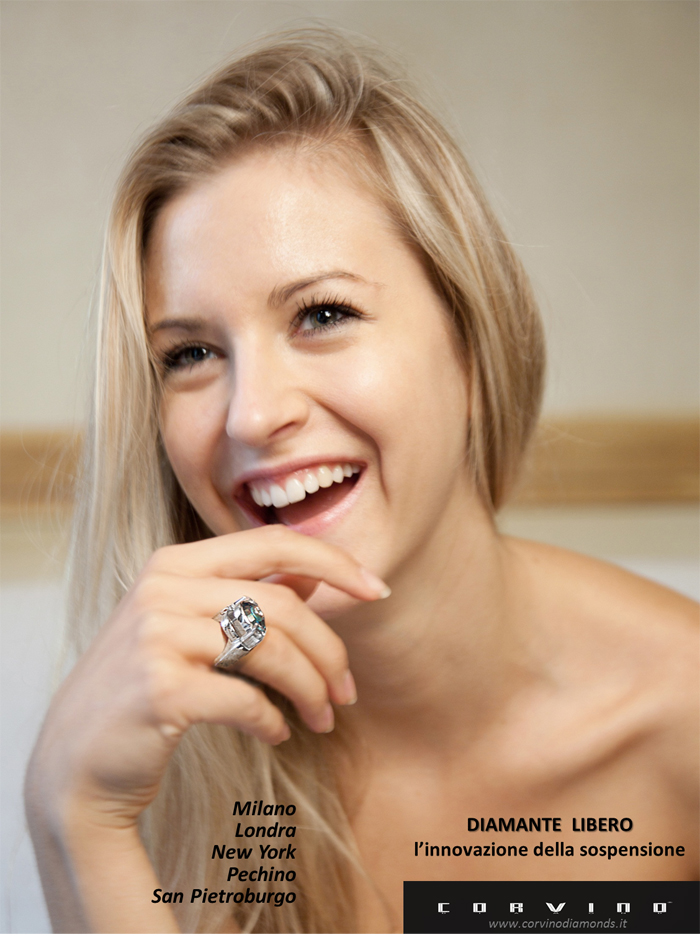
- Bookmark :
- Digg
- del.icio.us
- Stumbleupon
- Redit it
The three Renaissance Capitals of the World!
- Posted by - (0) Comment
Did you know that throughout the Renaissance period, when Italy was a trading centre and a melting pot for the world’s greatest civilisations, Vilnius also became a Renaissance centre, competing with Florence and Milan?
The two great nations merged when Grand Duke Sigismund the Old (1467-1548) married the Princess of the Italian city of Milan, Bona Sforza, and returned to reign in and from Vilnius as the capital of the Grand Duchy of Lithuania. The royal couple created an Italian community within the court and, under the influence of the new Grand Duchess, Italian culture became the preoccupation of the city’s elite….
- Bookmark :
- Digg
- del.icio.us
- Stumbleupon
- Redit it
- Posted by - (0) Comment
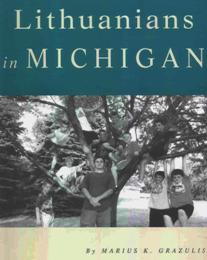
. The book is soft cover and 103 pages long. This was part of a series, such as Hungarians in Michigan, Latvians in Michigan, Mexicans in Michigan, Poles in Michigan, etc. This particular book gives the reader an introduction to the Lithuanian history and the reasons and circumstances they settled in Michigan. It also takes pride in listing the contributions this ethnic group has made in Michigan, and highlights some of their important organizations here. My town of Albion is mentioned and my grandfather's (Nikodemas Kulikauskas (Mike Kulikowski) picture with the fish is in this. Also in here is a "Lithuania Lunch" token from Detroit.
Frank Passic
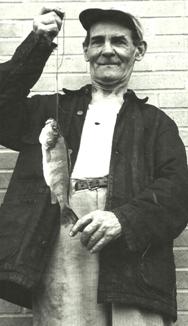
- Bookmark :
- Digg
- del.icio.us
- Stumbleupon
- Redit it
- Posted by - (0) Comment
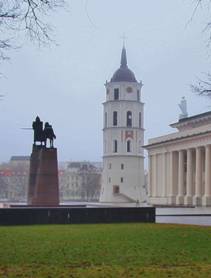
Vilnius through
Indian eyes…
The past is never too far behind in Vilnius — it whispers from the plaques outside the Museum of Genocide Victims located in the old KGB headquarters — one plaque for every person that was executed inside. A visit to the museum with its cells, solitary confinement rooms, torture rooms and even eavesdropping devices that were used, is a sobering experience.
Once Vilnius had a prominent Jewish community and was called the “Jerusalem of the North”. More than 90 per cent of the Jewish community was liquidated under the Nazis and today only one of the 105 synagogues survives. Walking along the winding Stikliu Street in the Jewish quarter, which was once the glass blowers’ street, is a pleasant experience. There are classy ateliers selling stained glass, jewellery and art. You can indulge your sweet tooth at the French patisserie Poniu Laime. On my last day in the city I take a funicular to the fortress on the Gediminas hill, and look down at the panorama of the city: red roofs jostling with spires and domes, providing a counterpoint to the glitzy new city across the river with steel and glass skyscrapers. The perfect metaphor for a city with its feet rooted in the past but its head firmly focused on the future.
Read more…
- Bookmark :
- Digg
- del.icio.us
- Stumbleupon
- Redit it
- Posted by - (0) Comment

Lithuanians
in the World
VilNews will from time to time present Lithuanians who have left the home country and made some kind of career abroad. We are this time not so much looking for celebrity articles, more for some unusual life stories describing Lithuanians who have settled somewhere in the world. Send us your story!- Bookmark :
- Digg
- del.icio.us
- Stumbleupon
- Redit it
- Posted by - (0) Comment
Has the spirit of
January 1991 returned?

Is there a new Lithuanian awakening in the making?
What do you, dear reader, think?
By Aage Myhre, editor-in-chief
aage.myhre@VilNews.com
The 22 years that have passed since January 1991, when the Lithuanian people in an exemplary, peaceful manner stood up against the violent Soviet re-occupation, have only rarely lived up to the expectations I and many with me had by then.
Neither Landsbergis, Brazauskas, nor later leaders delivered when the new statehood was to be developed during the 1990s.
The country's newfound freedom did not lead to the type of growth and better living conditions for the broad masses, that had been expected. Also, the warmer, friendlier and more human society we all waited for never occurred. When the people who had shown their support for the new won independence from the Soviet Union returned to their towns and villages in the spring of 1991, much of the community spirit was gone and did not appear since.
Different leaders have since those days made some half-hearted attempts to regain team feeling, cooperation and community spirit within groups of the Lithuanian people. These attempts have largely been met with shrug and distrust, and few politicians have gained genuine respect of their own people.
The EU membership in 2004 did not become the boost that had been expected. Certainly, the economy enjoyed a positive step forward, but not much positive happened for the broad masses of the people.
Therefore, the most striking result of the membership and the open borders to the West, was a mass exodus unparalleled in and for any other country of today.
The enormous crisis that began in 2008 made the situation even worse, almost unbearable for many, and one felt that it was only a matter of time before the country would collapse, emptied of inhabitants.
Then, a year or two ago, I felt that something was happening down in the grassroots of business people and others. I discovered more and more young professionals who began to define their own paths, no longer waiting for the older generations of leaders to show the way.
When I this year marked 13 January in the Lithuanian Parliament Building, 22 years after I in 1991 stood there with Professor Landsbergis looking out the window at the bonfires, barricades and the huge crowd of unarmed people who had gathered to protect their president and the country's future as a free nation, I saw something completely new to me…
- Bookmark :
- Digg
- del.icio.us
- Stumbleupon
- Redit it
- Posted by - (0) Comment
Has the spirit of
January 1991 returned?

Is there a new Lithuanian awakening in the making?
What do you, dear reader, think?
By Aage Myhre, editor-in-chief
aage.myhre@VilNews.com
The 22 years that have passed since January 1991, when the Lithuanian people in an exemplary, peaceful manner stood up against the violent Soviet re-occupation, have only rarely lived up to the expectations I and many with me had by then.
Neither Landsbergis, Brazauskas, nor later leaders delivered when the new statehood was to be developed during the 1990s.
The country's newfound freedom did not lead to the type of growth and better living conditions for the broad masses, that had been expected. Also, the warmer, friendlier and more human society we all waited for never occurred. When the people who had shown their support for the new won independence from the Soviet Union returned to their towns and villages in the spring of 1991, much of the community spirit was gone and did not appear since.
Different leaders have since those days made some half-hearted attempts to regain team feeling, cooperation and community spirit within groups of the Lithuanian people. These attempts have largely been met with shrug and distrust, and few politicians have gained genuine respect of their own people.
The EU membership in 2004 did not become the boost that had been expected. Certainly, the economy enjoyed a positive step forward, but not much positive happened for the broad masses of the people.
Therefore, the most striking result of the membership and the open borders to the West, was a mass exodus unparalleled in and for any other country of today.
The enormous crisis that began in 2008 made the situation even worse, almost unbearable for many, and one felt that it was only a matter of time before the country would collapse, emptied of inhabitants.
Then, a year or two ago, I felt that something was happening down in the grassroots of business people and others. I discovered more and more young professionals who began to define their own paths, no longer waiting for the older generations of leaders to show the way.
When I this year marked 13 January in the Lithuanian Parliament Building, 22 years after I in 1991 stood there with Professor Landsbergis looking out the window at the bonfires, barricades and the huge crowd of unarmed people who had gathered to protect their president and the country's future as a free nation, I saw something completely new to me.
I was, now in 2013, there with a group of young Lithuanians, most of them so young that they do not have their own memories of what happened there 22 years ago. Yet the memories of the sad events in January 1991 were obviously alive and present for them. They wanted to underline that freedom and independence is not something one can take for granted. I was there with some of Lithuania's future politicians – young, well-educated, smart leaders that this country a few years ago could only dream about.
I walked around with them in the Parliament this 13th January. I saw their interests, and their pride in belonging to a great nation like this.
I also saw large photographs on the walls, with Lithuania's parliamentary history of the interwar time and from the years after the Declaration of Independence 11 March 1990. The sadness I felt when I walked around in these corridors 22 years was gone, now I felt only joy, and optimism regarding the country's future and its political leaders for the years to soon come.
I had, before this visit, seen young Lithuanian business people in full swing building up more professional structures and attitudes. That I now saw the same happen among young politicians was very gratifying.
Both of these groups feel to some extent that our brand new government is a step backwards, back to the "nomenclature times", but their young, Western-type way of thinking is certainly very encouraging and I think we are facing a crossroads which bodes well for Lithuania!
It is precisely such attitudes I now see more and more of among young Lithuanians. And this time, it appears that they are ready to take matters into their own hands, no longer waiting for the older politicians and leaders to show the way. It almost feels as if the spirit of January 1991 is back, now in a structured, pragmatic and professional manner.
What do you, dear reader, think? Is there a new awakening in the making? Has the spirit of 1991 returned?
- Bookmark :
- Digg
- del.icio.us
- Stumbleupon
- Redit it
UK educated Lithuanians are now returning home!
- Posted by - (0) Comment
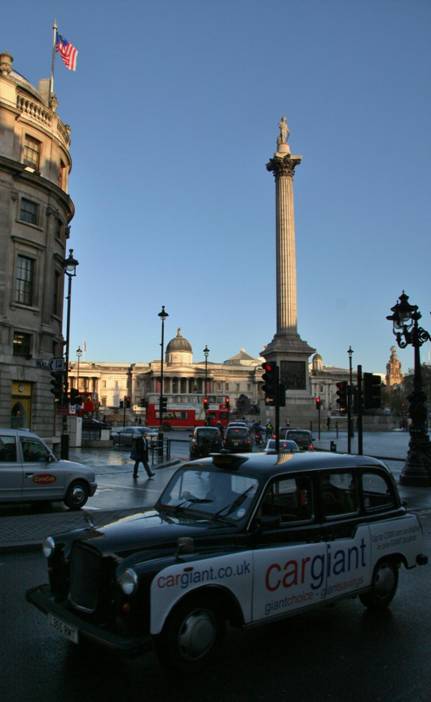
Lithuanians are now returning home from the UK. In cabs?
Photo: Aage Myhre.
A recent guadian.co.uk article on Lithuanians in the UK discusses how well Lithuanians integrated in the British society and made Britain their home. At the same time, the Guardian outlines a new trend of UK-educated young professionals; many are now moving back to Lithuania!
It also mentions Lithuanian government’s initiatives to encourage Lithuanians living abroad to look for opportunities back home, such as the new Junior Professionals Programme „Kurk Lietuvai“ (Eng. “Create for Lithuania”) that was initiated by Invest Lithuania.
Programme “Kurk Lietuvai” attracted a lot of attention among young Lithuanian professionals abroad and was noted by the guardian.co.uk as a fine effort to encourage the young professionals to return home. The pioneering project was successfully launched in September last year, offering one-year internships in the heart of government ministries and public institutions. “The project is aimed exclusively at young Lithuanians with degrees from the best foreign universities and will undoubtedly woo some of the brightest back”, - writes the guardian.co.uk.
Lithuania promotes its highly qualified labour pool as one of the key factors attracting foreign investment to the country. Multinational companies consistently identify the high quality of staff as the most positive aspect of their experience in Lithuania.
Read the full article here
- Bookmark :
- Digg
- del.icio.us
- Stumbleupon
- Redit it
- Posted by - (0) Comment
 Great Britain is
Great Britain is
green & glorious!
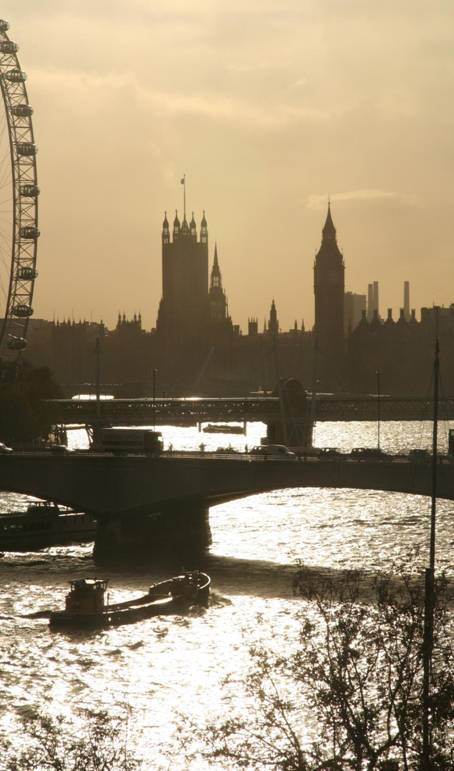
Lithuanians are now returning home from the UK. On the River Thames?
Photo: Aage Myhre
Following Lithuania’s Independence and especially after European Union and NATO membership more and more Lithuanians have chosen to live and work in the United Kingdom. There are more than 100,000 Lithuanians in London and over 200, 000 in the UK. The largest Lithuanian communities can be found in London, Birmingham, Manchester, Nottingham, Bradford, and in Scotland. As a result of this, there are numerous Lithuanian organisations (such as a Lithuanian newspaper, schools and Lithuanian Churches) working in the UK. If you are interested in practicing your Lithuanian or just would like to meet Lithuanians, to know more about our culture and traditions, or even to participate in some cultural events, why not try looking at these two websites:
www.lithuanianembassy.co.uk – this is the Lithuanian Embassy’s page on cultural events in the UK. This is the best place to look for information on various events.
www.headleypark.co.uk - Headley Park estate belongs to the Lithuanian community and is the hub of all cultural activities. So, if you want to experience St. John’s Day, Christmas or any other celebrations Lithuanian style you should contact them and ask for more info. Headley Estate also has a hotel, a Lithuanian food restaurant and a camping site with a lake full of fish nearby which is ideal for a summer weekend break.
www.britanijoslietuviai.co.uk - official website for Lithuanian association in the UK.
www.toplanguagecommunity.com/lithuanian-portal/ - this is a Lithuanian community site for Lithuanian speaking people in London, UK and Ireland. The site is available in both Lithuanian and English.
Lithuanian Communities in the UK
www.jkljs.ahost.lt - Lithuanian Youth Community in the UK
www.midlitcom.org - Midlands Lithuanian community
bhamlietuviai.org Lithuanian community in Birmingham
www.manchesteris.org - Lithuanian community in Manchester
www.lithuanianchamber.co.uk - Lithuanian chamber of commerce in the UK
- Bookmark :
- Digg
- del.icio.us
- Stumbleupon
- Redit it
- Posted by - (1) Comment
|
|
Great Britain is green & glorious |

Laugharne Castle in Wales.
Photo: www.landscapes-online.com
|
The United Kingdom The United Kingdom includes the island of Great Britain, the north-eastern part of the island of Ireland and many smaller islands. Northern Ireland is the only part of the UK that shares a land border with another sovereign state—the Republic of Ireland. Apart from this land border the UK is surrounded by the Atlantic Ocean, the North Sea, the English Channel and the Irish Sea. The United Kingdom is a unitary state governed under a constitutional monarchy and a parliamentary system, with its seat of government in the capital city of London. It is a country in its own right and consists of four countries: England, Northern Ireland, Scotland and Wales. There are three devolved national administrations, each with varying powers, situated in Belfast, Cardiff and Edinburgh; the capitals of Northern Ireland, Wales and Scotland respectively. Associated with the UK, but not constitutionally part of it, are three Crown Dependencies. The United Kingdom has fourteen overseas territories. These are remnants of the British Empire which, at its height in 1922, encompassed almost a quarter of the world's land surface and was the largest empire in history. British influence can still be observed in the language, culture and legal systems of many of its former territories. The UK is a developed country and has the world's seventh-largest economy by nominal GDP and seventh-largest economy by purchasing power parity. It was the world's first industrialised country and the world's foremost power during the 19th and early 20th centuries. Queen Elizabeth II is the head of state of the UK as well as of fifteen other independent Commonwealth countries. The monarch itself is symbolic rather than political, and only has "the right to be consulted, the right to encourage, and the right to warn". The United Kingdom has an uncodified constitution, as do only three other countries in the world. The Constitution of the United Kingdom thus consists mostly of a collection of disparate written sources, including statutes, judge-made case law and international treaties, together with constitutional conventions. As there is no technical difference between ordinary statutes and "constitutional law" the UK Parliament can perform "constitutional reform" simply by passing Acts of Parliament and thus has the political power to change or abolish almost any written or unwritten element of the constitution. However, no Parliament can pass laws that future Parliaments cannot change. |
|
|
|
London
|
|
It is November. I'm on my way to London from Dover, in my own car. A bit weird to drive on the left side of the road. But London is fantastic, one of my absolute favourite cities in the world. Especially now that Christmas is approaching. This is the city to visit for Christmas shopping and much, much more. The special light. Lavishly decorated stores on Oxford Street. Good smell from every street corner. A pint at The White Lion in Covent Garden... |

Buckingham Palace, the Queen’s home.

River Thames.
Photos: Aage Myhre
London is made up of buildings from many different architectural styles. Most were built after the great fire of1666. Tower of London, Westminster Abbey and some Tudor houses are fine exceptions. The famous architect Christopher Wren (1632-1723), was responsible for many great buildings after the fire. 500 churches, among others. In the 18th and 19 century, known financial institutions grew up, not least the Royal Exchange and Bank of England. From the early 20th century, it is worth mentioning the Old Bailey (criminal court for England andWales). In 1960, the Barbican Estate was erected. Lloyd's 80-century skyscraper and 'the Gerikin' from 2004 are exciting new additions.
A late autumn walk in the park next to The Mall, on our way to Buckingham Palace.

The White Lion pub in Covent Garden.
Photos: Aage Myhre.

Trafalger Square and the Nelson's Column that is guarded by four lion statues at its base.
Photo: Aage Myhre.

River Thames.
Photos: Aage Myhre

Lithuanians in the UK
Following Lithuania’s Independence and especially after European Union and NATO membership more and more Lithuanians have chosen to live and work in the United Kingdom. There are more than 100,000 Lithuanians in London and over 200, 000 in the UK. The largest Lithuanian communities can be found in London, Birmingham, Manchester, Nottingham, Bradford, and in Scotland. As a result of this, there are numerous Lithuanian organisations (such as a Lithuanian newspaper, schools and Lithuanian Churches) working in the UK. If you are interested in practicing your Lithuanian or just would like to meet Lithuanians, to know more about our culture and traditions, or even to participate in some cultural events, why not try looking at these two websites:
www.lithuanianembassy.co.uk – this is the Lithuanian Embassy’s page on cultural events in the UK. This is the best place to look for information on various events.
www.headleypark.co.uk - Headley Park estate belongs to the Lithuanian community and is the hub of all cultural activities. So, if you want to experience St. John’s Day, Christmas or any other celebrations Lithuanian style you should contact them and ask for more info. Headley Estate also has a hotel, a Lithuanian food restaurant and a camping site with a lake full of fish nearby which is ideal for a summer weekend break.
www.britanijoslietuviai.co.uk - official website for Lithuanian association in the UK.
www.toplanguagecommunity.com/lithuanian-portal/ - this is a Lithuanian community site for Lithuanian speaking people in London, UK and Ireland. The site is available in both Lithuanian and English.
Lithuanian Communities in the UK
www.jkljs.ahost.lt - Lithuanian Youth Community in the UK
www.midlitcom.org - Midlands Lithuanian community
bhamlietuviai.org Lithuanian community in Birmingham
www.manchesteris.org - Lithuanian community in Manchester
www.lithuanianchamber.co.uk - Lithuanian chamber of commerce in the UK
Lithuanian Schools in the UK
www.lithuanianembassy.co.uk
www.britanijoslietuviai.co.uk/lituanistines_mokyklos.html
Religious Organisations
Lithuanian church in London:
Londono lietuvių Šv.Kazimiero bažnyčia
21 The Oval, Hackney Road, London E2 9DT. Tel: 020 7739 8735
E-mail: ptverijonas@btinternet.com Website: www.londonas.co.uk
Religious and cultural hub in Nottingham, lead by Lithuanian Marian fathers:
Židinys
Lithuanian Marian Fathers, 16 Hound Road
West Bridgford, Nottingham NG2 6AH. Tel.: 01159821892
Music
Lithuanian folk group, Saduto
www.saduto.com/en/aboutus
Saduto was established in 2005. Group members gather every Friday evening at 8:00pm in St. John‘s church, Stratford, London. Everyone is invited.
Rock group, Vital Mission
Website: www.ferrum.lt/f/grupes/128
Lithuanian Scouts in the UK
The Lithuanian scouts movement in the UK started back in 1948. The first camp was organised in 1950, Darley Moor, Derbyshire.
It currently has about 50 members ranging from 8 to 70 years old. They meet every second month and have a camp in Headley Park during summer months.
Lithuanian scouts have their magazine 'Budėkime' which is published three times a year.
Lithuanian Basketball Team in the UK
The Lithuanian basketball team, Gintaras
www.gintaras.co.uk/content/view/4/16/lang,english/
Currently, Lithuanian BC (playing in London Metropolitan Basketball League) is on the top of the Men’s Premier League 2008-2009 table. Results can be viewed here:
www.basketballinlondon.co.uk/london_metropolitan_basketball_league/league_fixtures_&_results/
|
Lithuanian City of London Club is a members-only non-profit organisation established in late 2006 under the honorary patronage of H.E. Vygaudas Usackas, the Ambassador of the Republic of Lithuania. The members of the Club are Lithuanian professionals (or professionals with ties/interests in Lithuania) based in London from a wide array of careers and pursuits, predominantly from the City. The Club members get together for social networking, sporting and charitable events as well as for a wide array of topical discussions with business, political and other leaders from Lithuania and UK to foster professional and intellectual interaction between Club members and Lithuanian society. The Club is also building links with other organisations in the UK and actively participates in a number of initiatives and events in the Lithuanian community in London. The Club's President: Daumantas Mockus, president@litcityclub.co.uk LCLC Newsletter
|
|
|
|
Aer Lingus launched services to Vilnius from its London Gatwick last year. Cutting the ribbon in the photo is Dr. Oskaras Jusys, the Lithuanian ambassador to the UK. |
|
Cambridge University is consistently ranked one of the top ten in the world |
||
|
The city of Cambridge is a university town and the administrative centre of the county of Cambridgeshire, England. It lies in East Anglia about 50 miles (80 km) north of London. Cambridge is at the heart of the high-technology centre known as Silicon Fen – a play on Silicon Valley and the fens surrounding the city. Cambridge is well known as the home of the University of Cambridge, which has been consistently ranked one of the top ten universities in the world. The university includes the renowned Cavendish Laboratory, King's College Chapel, and the Cambridge University Library. The Cambridge skyline is dominated by the last two buildings, along with the chimney of Addenbrooke's Hospital in the far south of the city and St John's College Chapel tower in the north. According to the United Kingdom Census 2001, the city's population was 108,863 (including 22,153 students). |
|
|
|
Cambridge University Lithuanian Society [CULS]
|
||
Robin Hood and the Sherwood Forest
When we continue north to the city of Leeds a road sign with the name of Nottingham shows up, I decide to take a detour into the Sherwood Forest, Robin Hood's famous habitat. Sherwood Forest is a Royal Forest in Nottinghamshire that is famous through its historical association with the legendary outlaw archer who took from the rich and gave to the poor here, right in the heart of medieval England. This very attractive forest lands attracts 500,000 tourists annually, including many from around the world. Visitor numbers have increased significantly since the launch of the BBC's Robin Hood television series in 2006.
The park hosts the annual Robin Hood Festival for a week each summer. This event recreates a medieval atmosphere and features the major characters from the Robin Hood legend. The week's entertainment includes jousters and strolling players, dressed in medieval attire, in addition to a medieval encampment complete with jesters, musicians, rat-catchers, alchemists and fire eaters.
|
The New Adventures of Robin Hood was filmed in Lithuania The New Adventures of Robin Hood is a 1997-1998 live action TV series on Turner Network Television. It was filmed in Vilnius, Lithuania and produced and distributed by Dune Productions, M6, and Warner Bros. International.
|
|
|
|
Robin Hood was a heroic outlaw in English folklore. A highly skilled archer and swordsman, he is known for "robbing from the rich and giving to the poor", assisted by a group of fellow outlaws known as his "Merry Men". Traditionally, Robin Hood and his men are depicted wearing Lincoln green clothes. The origin of the legend is claimed by some to have stemmed from actual outlaws, or from ballads or tales of outlaws. Robin Hood became a popular folk figure in the medieval period continuing through to modern literature, films and television. In the earliest sources, Robin Hood is a yeoman, but he was often later portrayed as an aristocrat wrongfully dispossessed of his lands and made into an outlaw by an unscrupulous sheriff. In popular culture, Robin Hood and his band of Merry men are usually portrayed as living in Sherwood Forest, in Nottinghamshire, where much of the action in the early ballads takes place. So does the very first recorded Robin Hood rhyme, four lines from the early 15th century, beginning: "Robyn hode in scherewode stod." However, the overall picture from the surviving early ballads and other early references suggest that Robin Hood may have been based in the Barnsdale area of what is now South Yorkshire (which borders Nottinghamshire).
|
Leeds has England’s most romantic castle

Leeds Castle, acclaimed as the most romantic castle in England.
Photo: www.castles.org.
Our journey north continues. We arrive in Leeds, a city and metropolitan borough in West Yorkshire. In 2001 Leeds' main urban subdivision had a population of 443,247, while the entire city has a population of 798,800 (2011 est.), making it the 30th-most populous city in the European Union. Leeds is the cultural, financial and commercial heart of the West Yorkshire Urban Area, which at the 2001 census had a population of 1.5 million, and the Leeds-Bradford Metropolitan Area, of which Leeds is the integral part, had a population of around 2.3 million, making it the fourth-largest metropolitan area in the United Kingdom. In addition, the Leeds city region, an economic area with Leeds at its core, had a population of 2.9 million. Leeds is the UK's largest centre for business, legal, and financial services outside London, and its office market is the best in Europe for value. Leeds is considered a Gamma World City, alongside cities such as Rotterdam, Phoenix, St. Petersburg and Valencia.
|
|
From Leeds to Lithuania for mushy pea beer My grandparents came from Kowno (now more often known as Kaunas) in Lithuania. I have long wanted to visit Lithuania, and recently I did. Programs and wars have all but erased the culture I tasted as a child in Leeds, and my grandparents knew in Kaunas, but I did manage to see mead being made, and to sample the richly honeyish, herbal result. The old brewery building still stood, a tiny brick tower that may be unique in Lithuania, but would not look out of place in the Black Country. It is at Stakliskes, between Kaunas and Vilnius, the capital. Its product is simply called Lithuanian Mead (Lietuviskas Midus). Read more at: http://www.beerhunter.com/documents/19133-000921.html
|
Manchester hosts the oldest Lithuanian club in the UK
|
From Leeds our trip goes west, to Manchester. Here we find that there is a Lithuanian club with own premises in the city since the end of 1948, though the club as an organization has been in operation since 1925. It is the oldest Lithuanian organization in the UK. Manchester is a city and metropolitan borough in Greater Manchester, England. According to the Office for National Statistics, the 2010 mid-year population estimate for Manchester was 498,800. Manchester began to expand "at an astonishing rate" around the turn of the 19th century, brought on by a boom in textile manufacture during the Industrial Revolution, and resulted in it becoming the world's first industrialised city. An early 19th-century factory building boom transformed Manchester from a township into a major mill town and borough that was granted city status in 1853. In 1894 the Manchester Ship Canal was built, creating the Port of Manchester. The city is notable for its culture, music scene, scientific and engineering output, media links and sporting connections. Manchester's sports clubs include Premier League football teams, Manchester City and Manchester United. Manchester was also the site of the world's first railway station. |
|
Liverpool – birthplace of The Beatles
|
|
We have arrived in Liverpool – at the famous Mersey river and the shores of the Irish Sea on England’s western coast. The popularity of The Beatles, Gerry and the Pacemakers and other groups from the Merseybeat era have made Liverpool famous, and contributes a lot to the city’s status as a tourist destination. Some may say that football also has played a role... Liverpool is a city and metropolitan borough of Merseyside, along the eastern side of the Mersey Estuary. It was founded as a borough in 1207 and was granted city status in 1880. As of 2001 Liverpool had a population of 435,500, and lies at the centre of the wider Liverpool Urban Area, which had a population of 816,216. Liverpool is the home of two Premier League football clubs, Liverpool F.C. and Everton F.C.. Matches between the two clubs are known as the Merseyside derby. |
|
|
|
Liverpool companies invited to Lithuania
|
|
|
Invest Lithuania was last October hosting a seminar at Liverpool Chamber of Commerce to introduce the advantages, opportunities and support available to UK companies interested in developing their business in Lithuania. It was a multi-sector seminar but particularly relevant to those working in IT, bioscience, financial services and manufacturing companies considering investing in R&D. The seminar had a range of high quality speakers who introduced the Lithuanian market, its workforce and its competitive advantage as well as an overview of the support available to UK companies looking to invest in Lithuania. The speakers also gave detailed overviews of particular sectors and shared their experiences of working in Lithuania as well as giving the audience an opportunity to ask questions. This seminar was part of a series run by CC Baltic on behalf of Invest Lithuania, who were also holding seminars in Aberdeen and Teesside. The seminars are directed to companies interested in finding out why Lithuania today is considered one of the best places in Europe to develop business. Please contact Anatasia Zencika (Anastasia@ccbaltic.eu) or the International Trade Team (export@liverpoolchamber.org.uk) for more information.
|
|
|
The Beatles was discovered and managed by a Lithuanian Jew
Brian Epstein (1934-1967) was the man who discovered the Beatles, and guided them to mega-stardom, making them the most successful musical artists of all time. Without Brian, the Beatles as we came to know them, simply wouldn't have existed. In 1965, both Paul McCartney and George Harrison, on being awarded their M.B.E.s by the Queen, said "M.B.E. stands for Mr. Brian Epstein." Brian Samuel Epstein was an English music entrepreneur, and is best known for being the manager of The Beatles up until his death. In 1961 Brian Epstein saw the new band for the first time at The Cavern Club in Liverpool. After the concert he went to speak to them and offered to manage them. On 10th. December 1961 it was decided that Brian Epstein should be the manager of The Beatles, and a contract was signed on 24th. January, 1962. He secured a record contract for them with EMI, and, on the request of John Lennon, Paul McCartney, and George Harrison, he sacked the drummer Pete Best so that he could be replaced by Ringo Starr. Brian Epstein remained the manager on The Beatles until his death. Epstein paid for The Beatles to record a demo in Decca's studios, which Epstein later persuaded George Martin to listen to, as Decca were not interested in signing the band. Epstein was then offered a contract by Martin on behalf of EMI's small Parlophone label, even though they had previously been rejected by almost every other British record company. Martin later explained that Epstein's enthusiasm and his confidence that The Beatles would one day become internationally famous convinced him to sign them. Epstein died of an accidental drug overdose at his home in London in August 1967. The Beatles' early success has been attributed to Epstein's management and sense of style. McCartney said of Epstein: "If anyone was the Fifth Beatle, it was Brian". Epstein's family were Jewish, his grandfather, Isaac Epstein, was from Lithuania and arrived in England in the 1890s, at the age of eighteen. His grandmother, Dinah, was the daughter of Joseph (who was a draper) and Esther Hyman, who emigrated from Russia to England. Regrettably, the man who did so much for the Beatles has become a comparatively forgotten man since his death. VIDEO: LET IT BE Paul McCartney said he had the idea of "Let It Be" after a dream he had about his mother during the tense period surrounding the sessions for The Beatles (the "White Album"). McCartney explained that his mother—who died of cancer when McCartney was fourteen—was the inspiration for the "Mother Mary" lyric. He later said, "It was great to visit with her again. I felt very blessed to have that dream. So that got me writing 'Let It Be'." He also said in a later interview about the dream that his mother had told him, "It will be all right, just let it be."
|
|
Oxford – the dignified university city We have come to our trip's final destination, to Oxford, home of the second-oldest surviving university in the world and the oldest university in the English-speaking world. Oxford city is the county town of Oxfordshire, and forms a district within the county. It has a population of just under 165,000, of whom 153,900 live within the district boundary. It lies about 50 miles (80 km) north-west of London. The rivers Cherwell and Thames run through Oxford and meet south of the city centre. Oxford has a diverse economic base. Its industries include motor manufacturing, publishing and a large number of information technology and science-based businesses.
|
|
||
|
|
|||
|
|
|||
|
My Oxford friend Mervyn Bedford, a teacher in love with Lithuania
Because I know Aage Myhre and his wife and very much respect what he is trying to do for Lithuania, I offered to write of educational values for VilNews. The Baltic nations have a perfect opportunity to change the map of educational provision in ways that better fit the rapidly changing world of the 21st. century. Education is not about buildings. It is not about systems and organisations. It is not about tests and inspections. It is about people and the relationships between those who want to learn, or need to learn, and those who already know it. For almost 150 years State school systems have imposed a model of teaching and learning that has hardly changed while society has fundamentally changed and, recently, very rapidly. Those changes are racing unseen towards our youngest children. Read Mervyn’s article at https://vilnews.com/?p=979
|
- Bookmark :
- Digg
- del.icio.us
- Stumbleupon
- Redit it
- Posted by - (0) Comment
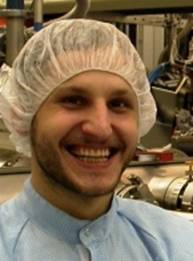
Dr. Kristijonas Vizbaras
VIC
VILNIUS INTERNATIONAL CLUB
VIC Meeting,
30 January at 19:00,
in ARTIS Hotel,
Liejyklos Str. 11/23, Vilnius.
Meeting topic:
"Laser Technology:
the Achievements of Lithuanians in Semiconductor Physics"
Speech by Dr. Kristijonas Vizbaras,
Co-founder of Brolis Semiconductors Ltd. serving as a CTO at the company. His field of expertise encompasses molecular beam epitaxy of III-V semiconductors. His innovations have resulted in a number of world-record devices. Kristijonas’ educational background is BSc in EE from Vilnius University (Lithuania), MSc in Physics from Royal Institute of Technology (Sweden) and PhD studies at Technische Universität München ( Germany). He has authored and co-authored more than 25 publications in leading scientific technical journals and conference proceedings.
Welcome to a new VIC Meeting! We invite both members and non-members, but hope many non-members will fill in the attached form and register as members of VIC. More information and membership form also at our website http://vilnius-international-club.com/
VilNews started as a newsletter
for VIC, back in 2001!
- Bookmark :
- Digg
- del.icio.us
- Stumbleupon
- Redit it
- Posted by - (0) Comment
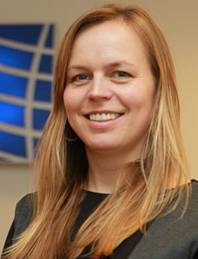
Milda Dargužaitė, general director
of the FDI promotion agency
Invest Lithuania
Lithuania has now the 5th fastest growth rate in the World!
“A boost in investments during the global economic slowdown marks a double victory”, says Milda Darguzaite, the head of Invest Lithuania.
Although the world is going through a decline in foreign direct investment, Lithuania is now among the best in the world.
According to the latest information from fDiMarkets.com, operated by the Financial Times, global greenfield investments fell by more than 22 per cent in the first ten months of 2012. Meanwhile, the number of foreign investment projects in Lithuania increased by 21 per cent in 2012 compared to 2011.
Lithuania ranks fifth in the world, third in Europe, and first among the Baltic States, according to this index.
Throughout the first ten months of 2012, the declared value of 29 FDI projects in Lithuania reached 927 million euros, creating 3,000 new jobs in the country, according to FDImarkets.com data. In comparison, during the same period of 2012, Estonia received 22 and Latvia received 6 projects that will create 1,942 and 783 new jobs respectively.
“The increasing number of FDI projects in Lithuania last year is an excellent proof that Lithuania remains a very attractive location to investors. It is a double victory that Lithuania managed to advance even when the global trends were going in the opposite direction, overall amount of investments decreasing”, says Milda Dargužaitė, general director of the FDI promotion agency Invest Lithuania. “This is a great testament to Lithuania’s potential.”
According to fDiMarkets.com, the largest share — 76% — of foreign investments in Lithuania in the first ten months of 2012 were new greenfield investments, and 24% were designated for the development of existing projects. One-fourth of the investments, or 24%, will go to the manufacturing sector, and the rest is comprised of investments in the service sector.
Last year the IT service centres such as Call Credit, the UK consumer risk management and credit control company, finance and IT competence centers of Paroc Group, one of the largest European manufacturers of stone wool insulation products and COWI A/S, a Danish engineering consultations and planning company started operating in Lithuania. Last year the service centres of Barclays and Western Union expanded significantly as well, and Danske Bank, the largest financial services group in Denmark, announced that it would establish a new service centre in Lithuania.
Foreign companies are the most desirable employers in Lithuania. In 2011, as many as 19 of the 20 most desirable employers in Lithuania had foreign capital. The average wage paid in foreign companies operating in Lithuania is more than two times higher than the average wage in the country.
- Bookmark :
- Digg
- del.icio.us
- Stumbleupon
- Redit it
- Posted by - (0) Comment
 |
Commemorating January 1991
|

21 January 1991: Soviet military vehicles dominated the streets of Vilnius. Dag Andersen and I presented a letter from Oslo Municipality, signed by Mayor Michael Tetzschner. Oslo offered Vilnius to become its first friendship city in the West. The letter was enthusiastically received by the Vilnius Mayor Arunas Grumadas and Deputy Mayor Regimantas Ciupaila.
Photo: Aftenposten, Norway.
Aage Myhre, VilNews Editor-in-Chief
aage.myhre@VilNews.com
We were two Norwegians working very much with Lithuanian affairs during autumn/winter of 1990-91, Dag Andersen and me. During our visit to Vilnius in January 1991, we showed our respect to President Vytautas Landsbergis in his Parliament office and worked with journalists to spread the message about the Soviet assault to the world.
We also brought with us a letter from the City Council Leader of Oslo, Michael Tetzschner inviting the Mayor of Vilnius to sign a sister city agreement. We handed the letter over to Mayor Arunas Grumadas on 21 January while Soviet troops were standing around in the streets and armoured vehicles roared around us.
The twin city agreement was signed a few months later, and Oslo became thus the first Western city to enter into such an agreement with Vilnius. I saw it as an important symbol of friendship and solidarity at a difficult time for a country under tremendous pressure and terrible abuse from Lithuania’s power loving neighbour to the east.
We came via Riga
We were a small group of Norwegians who travelled from Oslo to Vilnius a few days after the infamous Soviet attack and its killings on the 13th of January 1991. It was originally planned as a larger delegation, with parliamentarians, but they had to postpone their trip due to the death of our Norwegian King Olav.
We came to Vilnius via Copenhagen and Riga, whereto Scandinavian Airlines as the first western airline had established a route a few months earlier. Travel insurance cover was 400% higher than normal. The Baltic States were now defined as a war zone.
In Riga we first visited the Radio and Television House. The smoke from the many bonfires around the building lay like a blanket over the area, with a penetrating but good smell of firewood. It was an impressive sight to see the thousands of Latvians who camped around the territory in tents and primitive shelters to protect the freedom of peaceful broadcast against the Soviet perpetrators.
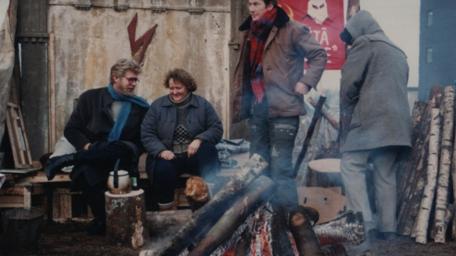
We, our Norwegian team, together with journalists travelled to Latvia and Lithuania as soon as we could after the Soviet attack in January 1991. The Balts refused to accept the Soviet invasion. They did their utmost to protect their governments and media. Here we are with 'activists' in Riga. For several weeks they made bonfires, staying here in tents night after night to demonstrate against the new Soviet assault.
Photo: Aage Myhre, January 1991.
- Bookmark :
- Digg
- del.icio.us
- Stumbleupon
- Redit it
- Posted by - (2) Comment
 |
Commemorating January 1991
|

21 January 1991: Soviet military vehicles dominated the streets of Vilnius. Dag Andersen and I presented a letter from Oslo Municipality, signed by Mayor Michael Tetzschner. Oslo offered Vilnius to become its first friendship city in the West. The letter was enthusiastically received by the Vilnius Mayor Arunas Grumadas and Deputy Mayor
Regimantas Ciupaila. Photo: Aftenposten, Norway.
Aage Myhre, VilNews Editor-in-Chief
aage.myhre@VilNews.com
We were two Norwegians working very much with Lithuanian affairs during autumn/winter of 1990-91, Dag Andersen and me. During our visit to Vilnius in January 1991, we showed our respect to President Vytautas Landsbergis in his Parliament office and worked with journalists to spread the message about the Soviet assault to the world.
We also brought with us a letter from the City Council Leader of Oslo, Michael Tetzschner inviting the Mayor of Vilnius to sign a sister city agreement. We handed the letter over to Mayor Arunas Grumadas on 21 January while Soviet troops were standing around in the streets and armoured vehicles roared around us.
The twin city agreement was signed a few months later, and Oslo became thus the first Western city to enter into such an agreement with Vilnius. I saw it as an important symbol of friendship and solidarity at a difficult time for a country under tremendous pressure and terrible abuse from Lithuania’s power loving neighbour to the east.
|
OSLO
The Oslo coat of arms is almost 700 years old. It shows the patron saint, of Oslo, St. Hallvard, sitting on a throne decorated with two lions' heads with a halo around his head. In front of the throne lies the woman whom he tried to protect. In one hand he holds the three arrows which killed both him and the woman. |
VILNIUS
In pagan times, until the end of the 14th century, the Vilnius coat of arms featured Titan Alkis, hero of Lithuanian ancient tales, carrying his wife Janteryte on his shoulders across the river.
|
During 1991 I came back to Lithuania several times. I saw more, understood more. The country began in earnest to fascinate me. I was also in Vilnius during the failed coup in Moscow in August 1991, again thrilling days. On the morning of 30 August 1991 I was probably the first person in modern times who got a Lithuanian visa that was legally accepted internationally, stamped into my Norwegian passport. Early morning the 30th of August 1991, the day when the Lithuanian migration authorities finally could do so in accordance with international rules.
The Soviet Union was finally a horror of the past. Also formally, Lithuania was once again a free and independent country. 50 years of abuse and oppression was over!
Vilnius images, winter 1990-91
|
|
Heavy tanks were used by the Soviet forces when they attacked the TV tower and the Parliament building in Vilnius on 13 January 1991 (left). They were met by a wall of unarmed people who refused to allow the intruders to again take control of their homeland. Inside the city they used armoured vehicles on rubber wheels (below). It was a bizarre, almost surreal experience to always hear the noise, feel the ground tremble when we were in meetings or trying to get a meal in one of the city's few restaurants. |
|
|
|
We often did our eating and drinking in Hotel Lietuva, in the so-called 'Black Bar', where only western, hard currencies were accepted. This bar was the centre for international media those January days. Every night we heard stories about how television crews and journalists had experienced rather harsh confrontations with the Soviet military units. |
|
||

Windows all over Vilnius were taped like this those
January days, in order not to break when the heavy
Soviet vehicles passed by.
|
|
|
|
|
ABOVE: During my first visit to Lithuania, in November 1990, I took this picture at Rotušes Square (Town Hall Square) in Vilnius. This was probably the very last picture ever made of the statue of Vincas Mickevičius-Kapsukas here. Next morning he had been knocked down by local activists... After the WWII Soviet occupation of Lithuania, his student Antanas Sniečkus (see our article https://vilnews.com/?p=6598) propagated Mickevičius' personality cult. In his honour the city of Marijampolė was renamed Kapsukas (1956–1989) and Vilnius University (1955–1990) bore his name. Two large sculptures of Mickevičius were erected in Vilnius: one here, in front of the Vilnius Town Hall (1962) and another, depicting Mickevičius with Lenin, in Antakalnis (1979). LEFT: You can today find the statue of Mickevičius-Kapsukas in the Grutas Park in Southern Lithuania. The park is the repository of old Soviet era statues and artefacts that were removed from public places when Soviet occupation of Lithuania ended.
|

Delivery of coal to properties in Pilies g. right in the centre of Vilnius, with horses, 22 years ago.
People picked the coal up in burlap sacks. Other times the horse driver was simply shovelling
the coal out on the sidewalk in front of the buildings on his ordering list.
Photo: Aage Myhre.

One of the few shop windows in Vilnius in 1990-91.
Photo: Aage Myhre.
We came via Riga
We were a small group of Norwegians who travelled from Oslo to Vilnius a few days after the infamous Soviet attack and its killings on the 13th of January 1991. It was originally planned as a larger delegation, with parliamentarians, but they had to postpone their trip due to the death of our Norwegian King Olav.
We came to Vilnius via Copenhagen and Riga, whereto Scandinavian Airlines as the first western airline had established a route a few months earlier. Travel insurance cover was 400% higher than normal. The Baltic States were now defined as a war zone.
In Riga we first visited the Radio and Television House. The smoke from the many bonfires around the building lay like a blanket over the area, with a penetrating but good smell of firewood. It was an impressive sight to see the thousands of Latvians who camped around the territory in tents and primitive shelters to protect the freedom of peaceful broadcast against the Soviet perpetrators.
Inside Riga's Old Town there were equally many bonfires and barricades, especially around the Latvian parliament building. Our delegation was given entrance passes, and that night we stood inside the building to show our support and talking to MPs and others who stayed there, many of them around the clock.
In the evening we experienced a rather startling example of the Soviet propaganda machinery when there on the TV news from Moscow was informed that Soviet soldiers had just moved in and taken control of the Parliament and Riga city. Not a single soldier was to see, neither inside nor outside the building, but this was a stunning reminder of how disinformation and propaganda are important parts of any war or conflict.
It was dangerous to embark on the road those days, but the Latvian Customs agreed to drive us, in their red jeeps, to the Lithuanian border next morning. On the Lithuanian side of the border, which still was not established with checkpoints, we were picked up by Lithuanian Lada cars, and not long after we were on the way to Vilnius. We passed convoys of Soviet military vehicles, but arrived without being stopped or subjected to interrogation of any kind.
Our main mission of the trip began…

We, our Norwegian team, together with journalists travelled to Latvia and Lithuania as soon as we could after the Soviet attack in January 1991. The Balts refused to accept the Soviet invasion. They did their utmost to protect their governments and media. Here we are with 'activists' in Riga. For several weeks they made bonfires, staying here in tents night after night to demonstrate against the new Soviet assault.
Photo: Aage Myhre, January 1991.

Without the intense media coverage that took place in January 1991, the outcome could well have become different. The Soviet occupiers could have re-taken control of the Baltic States. Here a journalist from Norwegian Aftenposten interviewing the leader of the Latvian border guards. The international press made a huge effort to make the world know about the Soviet atrocities.
Photo: Aage Myhre, January 1991.
Lithuania – Norway, a strong alliance also today!

- Bookmark :
- Digg
- del.icio.us
- Stumbleupon
- Redit it
New Lithuanian coins, of 1939-design, were bravely planned already in 1990
- Posted by - (0) Comment
Dear readers,
We are delighted and honored that Mr. Frank Passic of Michigan, USA, graciously continues to share with us his vast knowledge of Lithuanian numismatics. In this article he provides us with a very interesting look into how Lithuania already in April 1990 bravely started planning for the re-introduction of Litas as the nation’s currency.
Frank Passic of Albion, Michigan has collected, researched, and written about Lithuanian numismatics for many years. His educational displays of Lithuanian money have won numerous awards at state and national coin shows in the United States. Of Lithuanian heritage, his maternal grandparents emigrated from Lithuania to America just prior to World War I.
- Bookmark :
- Digg
- del.icio.us
- Stumbleupon
- Redit it
VilNews e-magazine is published in Vilnius, Lithuania. Editor-in-Chief: Mr. Aage Myhre. Inquires to the editors: editor@VilNews.com.
Code of Ethics: See Section 2 – about VilNews. VilNews is not responsible for content on external links/web pages.
HOW TO ADVERTISE IN VILNEWS.
All content is copyrighted © 2011. UAB ‘VilNews’.

 Click on the buttons to open and read each of VilNews' 18 sub-sections
Click on the buttons to open and read each of VilNews' 18 sub-sections 

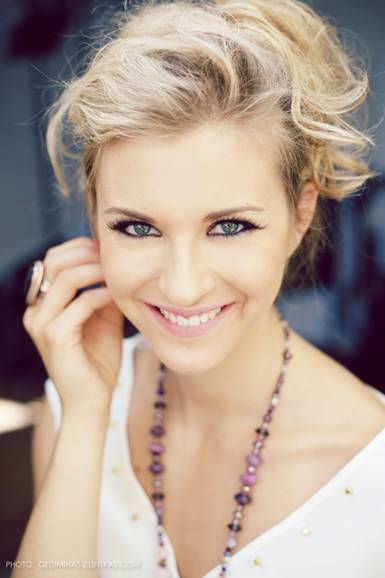



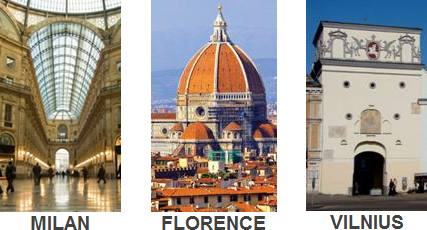






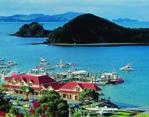

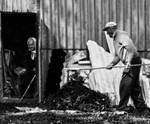







































.jpg)



